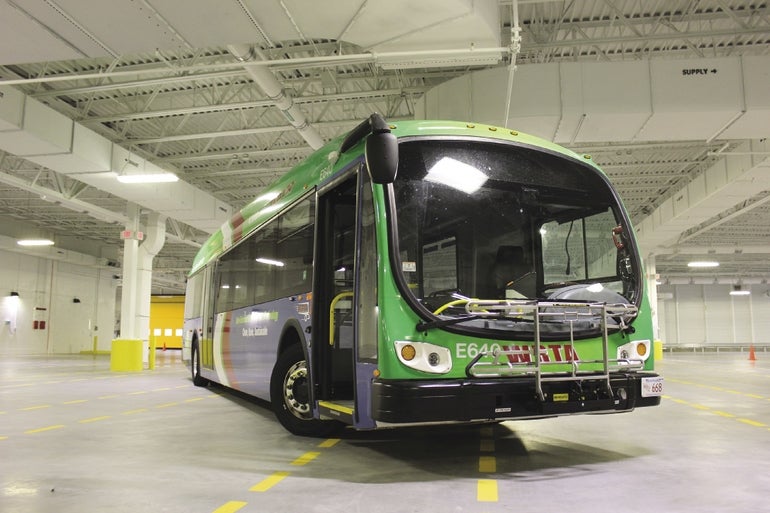For three years, electric buses have been roaming the streets of Worcester, silently and efficiently going about their business of transporting patrons.
Even though the Worcester Regional Transit Authority had to pay a $275,000 premium for those buses from California vehicle maker Proterra over the cost of a typical diesel bus – and spend another $650,000 on a fast-charging station – WRTA Administrator Jonathan Church said the switch has been positive, insulating the organization against fluctuations in fossil fuel prices and potentially offering cost-savings when those prices spike.
“Energy prices are what are going to drive decisions. If gasoline and diesel prices are going to go back up to five or six bucks a gallon, then it’s worth putting in that investment to look into electric or partial electric fleet,” said Church.
Adoption of electric vehicles among business and consumers in Massachusetts increased nearly 200 percent between 2013 and 2015 – aided by $10,000 in federal and state subsidies per vehicle, high fuel prices and the environmental movement for fewer greenhouse gas emissions – but the state is still well short of its goal of having electric vehicles comprise 15 percent of all vehicle sales by 2025.
Currently, EVs make up less than 2 percent of vehicles in Massachusetts, according to data from UMass Boston.
Proving the technology
For the past three years, the WRTA buses performed their job at a cheaper rate than the diesel equivalent, achieving an energy use equivalent of 8 to 19 miles per gallon compared to 4 to 6 for a traditional diesel bus, said Steve Clermont, a director and senior project manager at the Atlanta nonprofit Center for Transportation and the Environment.
Through May of this year, the six electric buses in the fleet have reduced the WRTA’s diesel consumption by more than 72,000 gallons.
“Even on its worst day when it’s pouring out heat or air conditioning, it’s going to be better than a diesel vehicle,” said Clermont, whose organization works to push advanced technology by helping businesses add electric vehicles to their fleet.
With the WRTA proving electric vehicles can work year-round in New England, Clermont is pushing for more businesses to add electric vehicles to their fleets, with his organization helping businesses find federal grants to make the transition.
“It’s sort of like buying a computer. There is always going to be better technology and better features in the next version, but that doesn’t mean you should put off purchasing an electric vehicle just to wait for the latest version to come out,” he said.
Massachusetts utility company National Grid was among the early adopters, bringing its first electric vehicles into its fleet back in the 1990s, said Michael Randazzo, principal fleet engineer for National Grid.
The company now operates 55 plug-in electric vehicles, and for the electricity company, it is about bringing its own operations in line with current needs in the state and technological advancements.
“The benefits of using PHEV’s include reducing carbon pollution, providing for a quieter work environment for our crews and customers and reducing our use of fossil fuels. We are also promoting the use of green technologies in the communities we serve,” Randazzo said.
Proving the business case
From 2013 to 2015, the adoption of electric vehicles in Massachusetts grew by 195 percent to 5,360 by the end of June 2015, according to data provided by David Cash, dean at the John W. McCormack Graduate School of Policy and Global Studies at the University of Massachusetts Boston.
That significant growth was sweetened by the $2,500 in state subsidies and $7,500 in federal subsidies for electric vehicles, said Will Lauwers, emerging technologies director for the Massachusetts Department of Environmental Resources, who added a new change makes vehicles costing more than $60,000 only eligible for a $1,000 state incentive.
As time goes on the decision by companies and individuals over whether to get electric vehicles will increasingly be a straight business case, said Lauwers.
“With the increasing number of options in the electric vehicle segment, there will be more and more business cases where it will make sense,” he said.
An organization must also weigh the additional cost of buy-in for the electric vehicle, said Church, as well as the cost of the infrastructure. For the WRTA, the difference today is a roughly $275,000 premium for the electric bus over a similar diesel model while also requiring the installation of a $650,000 fast-charging station.
“You have to install into the backup infrastructure,” Church said. “You have to factor all of this into your budget and into your operating cost. When [the price of] fuel is up, these are great.”
While the vehicles remain significantly more expensive, on the positive side for electric vehicles is a drivetrain that needs less maintenance than a traditional internal combustion engine, Lauwers said.
This is on top of potential fuel savings.
For Church, the WRTA’s decision was not driven by looking for pure savings, but to diversify the fleet and insulate against fossil fuel fluctuations.
Availability restrictions
However, the biggest limitations for a company comes down to whether an appropriate application exists.
According to Clermont, the heavy-duty and light-duty end of the vehicle market have strong electric support. This includes electric buses, but also delivery and waste management vehicles.
However, these are not vehicles that fleet managers can just walk into a dealer and buy off the lot, Clermont said.
The lighter-utility, consumer-grade electric vehicles, such as the Chevy Volt and Nissan Leaf, however do have fleet procurement programs and are available through local dealers.
There is still a lack of options in the middle grade, which is where many fleets operate, Clermont said.

